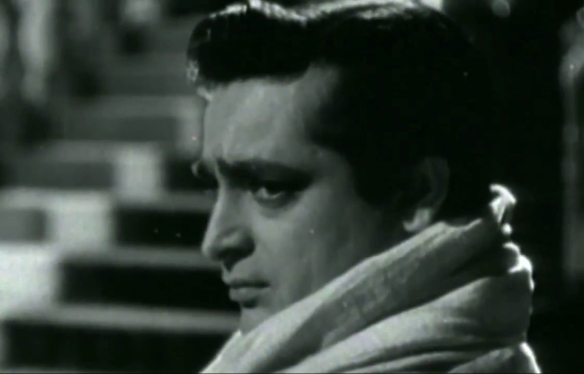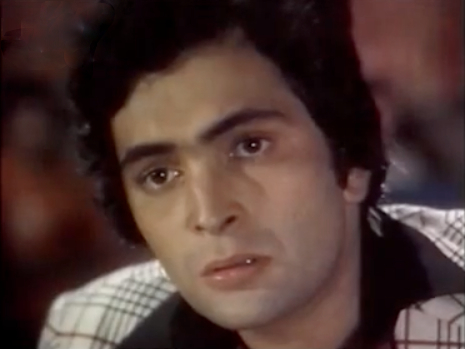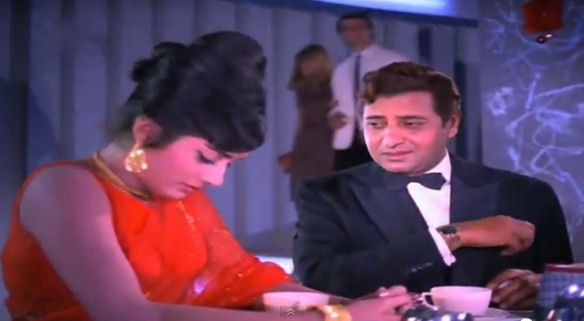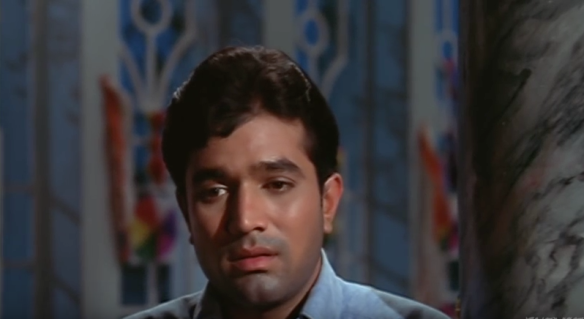
Rajesh Khanna plays a hard-working college student from a poor family in Do Raaste (1969).
Today we highlight the poignant lyrics and our English translation of “Khiza Ke Phool Pe” from Do Raaste (1969). Do Raaste is a classic family drama that hits hard on the tension between Eastern and Western values through an exploration of the dissolution of a joint family household. When one of the sons marries a rich “modernized” Indian girl who refuses to allow him to help pay off his family debt, the remaining relatives fall into poverty. The youngest son, played to perfection by Rajesh Khanna, must compromise his education by dropping out of college in order to support the family. He arrives at the birthday party of his wealthy girlfriend, played by Mumtaz (whose cutesy performance will at times make you want to hang yourself on the chandelier), and realizes that he no longer belongs in her world. The ensuing flood of feelings results in the beautiful ballad “Khiza Ke Phool Pe” written by Anand Bakshki with music by Laxmikant-Pyarelaal. Kishore Kumar’s voice takes on an initially softer, velvety shade that transitions fluidly to a powerful angst at the end of each antra. I dare you not to sigh when he croons, “mai.N roz lab pe naii ek aah taktaa huu.N.”
Though she says nothing that would disrupt the song, Mumtaz appears quite understandably mortified at his public display and rejection. For more uncomfortable dinner parties in Bollywood films, refer to our how-to guide on how to play the awkward miffed lover.
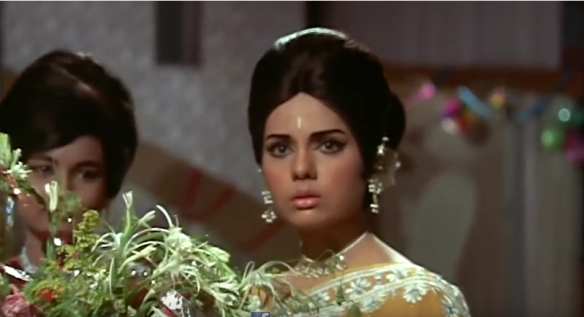
Mumtaz is heartbroken as Rajesh Khanna announces at her birthday party that they cannot be married in Do Raaste (1969).
Reminiscent of the hallowed “Waqt Ne Kiya” cinematography, in “Khiza Ke Phool Pe,” the camera simply soars with the gloriously endless dolly-ins and dolly-outs to accentuate each poetic moment, as if everyone weren’t already emotionally fragile after seeing Rajesh Khanna fight back tears. I applaud the film director Raj Khosla, despite the kitsch film set. The decor screams of the 1970s–emphasizing all those quasi-luxurious domestic ornaments that would in no way possibly make your life any better. The tinted glass cutout room divider is a textbook case in point. Still, the film crew made lemonade out of life’s interior design lemons.
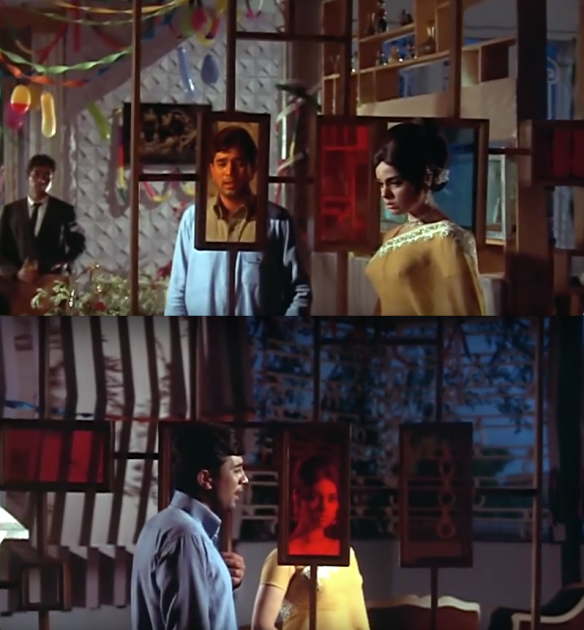
Rajesh Khanna and Mumtaz are separated by a bizarre art deco glass structure in her living room in the shot-reverse-shot sequence above. Note how in order to achieve this sequence with the actors seemingly continuing to face each other, Rajesh Khanna must move from the yellow panel to the blue panel on Mumtaz’s right for the reverse shot (below), breaking true visual continuity.
Check out the music video here and keep a box of tissues handy. We invite you join us below in our English translation and lyrics of “Khiza Ke Phool Pe” below:
Khiza Ke Phool Pe Lyrics and Translation:
Khizaa ke phuul pe aati kabhii bahaar nahii.N
The flower of Autumn never sees the Spring
Mere naseeb mei.N, aye dost, teraa pyaar nahii.N
Your love is not in my destiny, oh friend
Na jaane pyaar mei.N kab mai.N zubaa.N se phir jaauu.N
I do not know when in love I may go back on my words
Mai.N ban ke aa.Nsuu khud apnii nazar se gir jaauu.N
By becoming tears, I may fall in my own eyes
Terii qasam hai meraa koii aitbaar nahii.N
I swear by you, I have no confidence
Mere naseeb mei.N, aye dost, teraa pyaar nahii.N
Your love is not in my destiny, oh friend
Main roz lab pe nayii ek aah taktaa huu.N
Every day, a new sigh reaches my lips
Main roz ek naye gham kii raah taktaa huu.N
Every day, I await the arrival of a new sorrow
Kisii khushii kaa mere dil ko intezaar nahii.N
My heart is not waiting for any joy
Mere naseeb mei.N, aye dost, teraa pyaar nahii.N
Your love is not in my destiny, oh friend
Ghariib kaise mohabbat kare amiiro.N se?
How can someone poor love someone rich?
BichhaD gaye hai.N kaii Raanjhe apnii Heero.N se
Many legendary heroes have been separated from their heroines
Kisi ko apne muqaddar pe ikhtiyaar nahii.N
No one has a choice over their fate
Mere naseeb mei.N, aye dost, teraa pyaar nahii.N
Your love is not in my destiny, oh friend
Khizaa ke phuul pe aati kabhi bahaar nahii.N
The flower of Autumn never sees the Spring
Mere naseeb mei.N, aye dost, teraa pyaar nahii.N
Your love is not in my destiny, oh friend
Glossary:
khizaa: Autumn; phuul: flower; bahaar: Spring; kabhii nahii.N: never; naseeb: destiny, fortune; dost: friend; pyaar: love; na jaane: [I] do not know, [who] knows; kab: when; zubaan.N: word, language; phir jaanaa: go back; aa.Nsuu: tears; khud: self; nazar: eyes, gaze; girnaa: to fall; qasam: swear; aitbaar: confidence, trust; roz: every day; lab: lip; nayii: new; aah: sigh; gham: sorrow; raah taknaa: to await; khushii: happiness; [kisi ka] intezaar hona: to wait [for something]; ghariib: poor; mohabbat: love; amiir: rich; bichhaD jaanaa: to become separated; Raanjhaa: hero of a classic Hindustani tale of star-crossed lovers (Heer-Ranjha); Heer: heroine of a classic Hindustani tale of star-crossed lovers (Heer Ranjha); muqaddar: fate; ikhtiyaar: choice
Now go cheer yourself up with a pumpkin spice latte and wipe those tears off your face by indulging in a symphony of Rajesh Khanna winks.
– Mrs. 55






